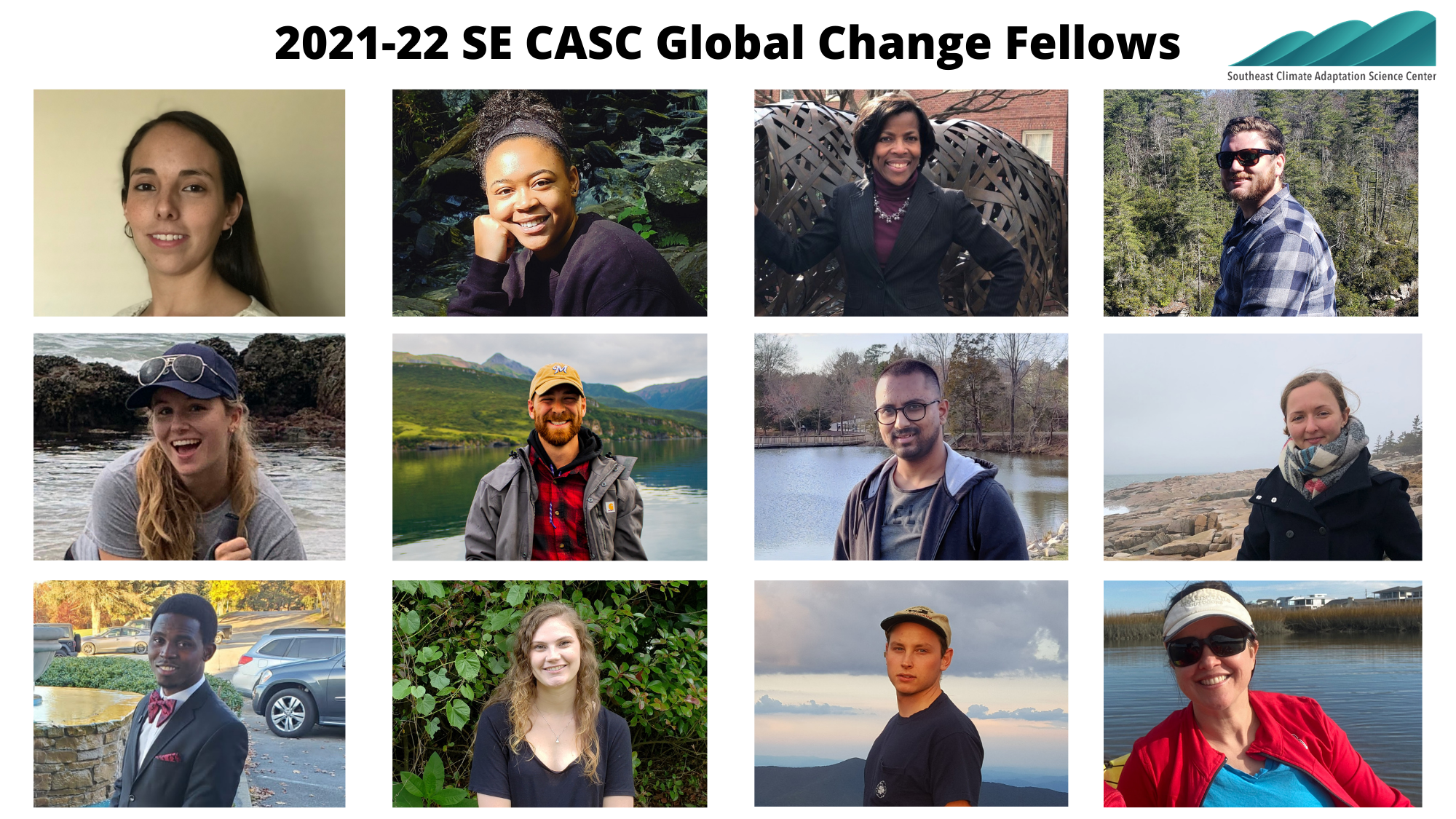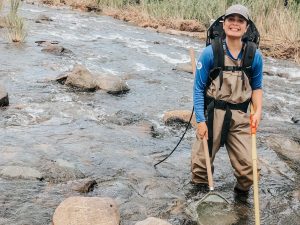Southeast CASC Now Accepting 2022-2023 Global Change Fellow Nominations

The Southeast Climate Adaptation Science Center is now accepting nominations for the 2022-2023 Global Change Fellows program. This program, now 10 years in existence, is designed to train the next generation of global change scientists by providing financial, scientific, and professional development support for graduate students who are interested in multi-disciplinary research. NC State Faculty Affiliates may nominate up to two students in a NC State Master’s or PhD program, though only one student can be accepted per affiliate. We welcome applications from a diversity of perspectives and backgrounds. Applications are due by Monday, January 31, 2022. Selection announcements will be made by mid-February.
The 2022-2023 cohort of Global Change Fellows will consist of 12 graduate students. We are especially seeking incoming PhD students to fill five of those openings.
- 2022-23 Global Change Fellows Announcement
- 2022-23 Global Change Fellows Nomination Form
- 2022-23 Nominee Personal Statement of Interest
NCSU Faculty Affiliates will be receiving an email soon with information about how to submit application materials.
– Join us for a virtual open house event on December 8th, 2021 at 1pm ET.
– Not a Faculty Affiliate, but interested in nominating a student? Apply here!
– Interested in nominating a student, but not sure if their research interests align with our mission?
Check out our Global Change Fellows webpage to see the multidisciplinary research projects that our current and former fellows have worked on.
– Visit our Frequently Asked Questions page to learn more about the program.
– Please direct any questions to Aranzazu Lascurain (SE CASC Assistant University Director) or Becky Irwin (SE CASC University Director) if you have any questions about the nomination process.
Student requirements for the Global Change Fellows Program:
- An expenses-paid one-week-long summer Climate Adaptation Science Field Intensive to be held off-campus shortly before fall 2022 classes begin focused on principles of SE CASC mission and climate adaptation challenges and strategies of resource managers.
- Regularly scheduled seminars every other week.
- Implementing at least two seminars as part of the SE CASC Global Change Seminar Series for fall and spring 2022-23.
- Students will complete a Researcher Spotlight highlighting their research and experience in the program.
Dates of Interest:
Virtual Open House: December 8th, 2021 | 1pm ET
Application Due Date: January 31, 2022
Selection Date: mid February, 2022
Commitment Date: March 14, 2022
Testimonials from former Global Change Fellows:
 “In my short time being a Global Change Fellow, I have been impacted in many ways. Through our seminars, we have the opportunity of meeting a multidisciplinary array of professionals from different agencies, organizations, communities, and universities. Learning about a diverse range of indispensable topics that you never knew could be so important for addressing global change has opened my mind to a wide range of possibilities and perspectives within my research, career, and personal life. I expect we will continue to enrich our knowledge and build connections with different leaders from diverse backgrounds and communities. I also look forward to continuing to gain useful tools that we can apply in our objectives and methods in order to contribute through our climate-related research to a wide range of stakeholders and communities.”
“In my short time being a Global Change Fellow, I have been impacted in many ways. Through our seminars, we have the opportunity of meeting a multidisciplinary array of professionals from different agencies, organizations, communities, and universities. Learning about a diverse range of indispensable topics that you never knew could be so important for addressing global change has opened my mind to a wide range of possibilities and perspectives within my research, career, and personal life. I expect we will continue to enrich our knowledge and build connections with different leaders from diverse backgrounds and communities. I also look forward to continuing to gain useful tools that we can apply in our objectives and methods in order to contribute through our climate-related research to a wide range of stakeholders and communities.”
— Ámbar Torres Molinari, 2020-2021 Fellow
 “As I continue through the Global Change Fellows Program, I feel it will enhance my ability to communicate my science with those not in my area of expertise, while emphasizing the value of effective communication in my own work when it comes to the execution of the broader impacts of my study. The Global Change Fellows Program has offered numerous opportunities for professional development and exposed me to a diverse group of scientists, which has encouraged me to begin to think about the more far reaching impacts of my work beyond the health and ecology of coastal ecosystems, to the people who work, live, and play in these systems as well.”
“As I continue through the Global Change Fellows Program, I feel it will enhance my ability to communicate my science with those not in my area of expertise, while emphasizing the value of effective communication in my own work when it comes to the execution of the broader impacts of my study. The Global Change Fellows Program has offered numerous opportunities for professional development and exposed me to a diverse group of scientists, which has encouraged me to begin to think about the more far reaching impacts of my work beyond the health and ecology of coastal ecosystems, to the people who work, live, and play in these systems as well.”
— Justine Neville, 2020-2021 Fellow
- Categories:
